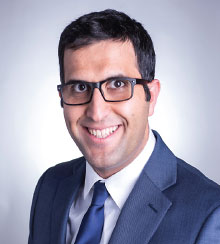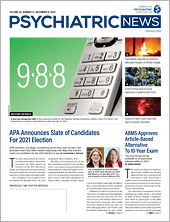E-cigarette use, also known as vaping, may be associated with an increased risk of sleep deprivation in young adults aged 18 to 24 years, a study in Addictive Behaviors has found. The study also suggests that e-cigarette use is rising in this age group.
“From previous studies we now know that cigarette smoking is linked to poor sleep outcomes. Because of the increasing popularity of e-cigarette use among young adults and nonsmokers and the importance of sleep quality on different aspects of health, we decided to conduct this study to better understand the association between e-cigarette use and sleep deprivation among young American adults,” lead author Sina Kianersi, D.V.M., told Psychiatric News. He is a graduate student in the Department of Epidemiology and Biostatistics at the Indiana University School of Public Health in Bloomington.
The researchers analyzed data from 18,945 young adults who participated in the Behavioral Risk Factor Surveillance System (BRFSS) in 2017 and 2018. The BRFSS is an annual telephone survey of adults living in the United States and its territories in which participants report on their health behaviors. Kianersi and colleagues drew their data from responses to questions that asked respondents how many hours they sleep in a 24-hour period; whether they have ever used an e-cigarette or other vaping device; and whether they currently use e-cigarettes or other vaping devices and, if so, how often. Sleep deprivation was defined as less than seven hours of sleep.
In 2018, 47% of young adults had ever used an e-cigarette, up from 39% the year before. In 2018, roughly 16% of young adults currently used e-cigarettes, up from 10% the year before. For both years, roughly 34% of young adults experienced sleep deprivation. Compared with young adults who had never used e-cigarettes, those who used e-cigarettes every day were 1.42 times more likely to report sleep deprivation.
“The strong association remained even after we controlled for other important sleep predictors, such as cigarette smoking and mental health status,” Kianersi said. “This is important because it implies that there might be a causal link there. We suggest further studies on the causal nature of this association.”
Kianersi added that because the study was observational, more research is necessary before the findings can be translated into clinical practice. Nonetheless, it is the first large study of its kind, involving young adults from 40 states, which improves the generalizability of the findings, he said.
“Sleep is important to overall health and well-being, and vaping may disrupt sleep,” Kianersi said. “Most importantly, as CDC recommends, nonsmokers should not use e-cigarettes.”
The authors reported no outside funding for this study. ■
“Association Between E-cigarette Use and Sleep Deprivation in U.S. Young Adults: Results from the 2017 and 2018 Behavioral Risk Factor Surveillance System” is posted
here.

